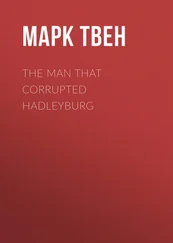Mark Twain - The Man That Corrupted Hadleyburg and Other Stories
Здесь есть возможность читать онлайн «Mark Twain - The Man That Corrupted Hadleyburg and Other Stories» весь текст электронной книги совершенно бесплатно (целиком полную версию без сокращений). В некоторых случаях можно слушать аудио, скачать через торрент в формате fb2 и присутствует краткое содержание. Год выпуска: 2004, Жанр: Классическая проза, Юмористическая проза, на английском языке. Описание произведения, (предисловие) а так же отзывы посетителей доступны на портале библиотеки ЛибКат.
- Название:The Man That Corrupted Hadleyburg and Other Stories
- Автор:
- Жанр:
- Год:2004
- ISBN:нет данных
- Рейтинг книги:4 / 5. Голосов: 1
-
Избранное:Добавить в избранное
- Отзывы:
-
Ваша оценка:
- 80
- 1
- 2
- 3
- 4
- 5
The Man That Corrupted Hadleyburg and Other Stories: краткое содержание, описание и аннотация
Предлагаем к чтению аннотацию, описание, краткое содержание или предисловие (зависит от того, что написал сам автор книги «The Man That Corrupted Hadleyburg and Other Stories»). Если вы не нашли необходимую информацию о книге — напишите в комментариях, мы постараемся отыскать её.
The Man That Corrupted Hadleyburg and Other Stories — читать онлайн бесплатно полную книгу (весь текст) целиком
Ниже представлен текст книги, разбитый по страницам. Система сохранения места последней прочитанной страницы, позволяет с удобством читать онлайн бесплатно книгу «The Man That Corrupted Hadleyburg and Other Stories», без необходимости каждый раз заново искать на чём Вы остановились. Поставьте закладку, и сможете в любой момент перейти на страницу, на которой закончили чтение.
Интервал:
Закладка:
'Now that you have given your word, my last hope is gone, for I know you will never go back from it. But you have done the best you could for John, and I have no reproaches for you. You love him, and you love me, and we know that if you could honourable save him, you would do it. I will go to him now, and be what help I can to him, and get what comfort I may out of the few days that are left to us before the night comes which will have no end for me in life. You will be with me that day? You will not let me bear it alone?'
'I will take you to him myself, poor child, and I will be near you to the last.'
By the governor's command, Clayton was now allowed every indulgence he might ask for which could interest his mind and soften the hardships of his imprisonment. His wife and child spent the days with him; I was his companion by night. He was removed from the narrow cell which he had occupied during such a dreary stretch of time, and given the chief warden's roomy and comfortable quarters. His mind was always busy with the catastrophe of his life, and with the slaughtered inventor, and he now took the fancy that he would like to have the telelectroscope and divert his mind with it. He had his wish. The connection was made with the international telephone-station, and day by day, and night by night, he called up one corner of the globe after another, and looked upon its life, and studied its strange sights, and spoke with its people, and realised that by grace of this marvellous instrument he was almost as free as the birds of the air, although a prisoner under locks and bars. He seldom spoke, and I never interrupted him when he was absorbed in this amusement. I sat in his parlour and read, and smoked, and the nights were very quiet and reposefully sociable, and I found them pleasant. Now and then I would her him say 'Give me Yedo;' next, 'Give me Hong-Kong;' next, 'Give me Melbourne.' And I smoked on, and read in comfort, while he wandered about the remote underworld, where the sun was shining in the sky, and the people were at their daily work. Sometimes the talk that came from those far regions through the microphone attachment interested me, and I listened.
Yesterday—I keep calling it yesterday, which is quite natural, for certain reasons—the instrument remained unused, and that also was natural, for it was the eve of the execution day. It was spent in tears and lamentations and farewells. The governor and the wife and child remained until a quarter-past eleven at night, and the scenes I witnessed were pitiful to see. The execution was to take place at four in the morning. A little after eleven a sound of hammering broke out upon the still night, and there was a glare of light, and the child cried out, 'What is that, papa?' and ran to the window before she could be stopped and clapped her small hands and said, 'Oh, come and see, mamma—such a pretty thing they are making!' The mother knew—and fainted. It was the gallows!
She was carried away to her lodging, poor woman, and Clayton and I were alone—alone, and thinking, brooding, dreaming. We might have been statues, we sat so motionless and still. It was a wild night, for winter was come again for a moment, after the habit of this region in the early spring. The sky was starless and black, and a strong wind was blowing from the lake. The silence in the room was so deep that all outside sounds seemed exaggerated by contrast with it. These sounds were fitting ones: they harmonised with the situation and the conditions: the boom and thunder of sudden storm-gusts among the roofs and chimneys, then the dying down into moanings and wailings about the eaves and angles; now and then a gnashing and lashing rush of sleet along the window-panes; and always the muffled and uncanny hammering of the gallows-builders in the court-yard. After an age of this, another sound—far off, and coming smothered and faint through the riot of the tempest—a bell tolling twelve! Another age, and it was tolled again. By-and-by, again. A dreary long interval after this, then the spectral sound floated to us once more—one, two three; and this time we caught our breath; sixty minutes of life left!
Clayton rose, and stood by the window, and looked up into the black sky, and listened to the thrashing sleet and the piping wind; then he said: 'That a dying man's last of earth should be—this!' After a little he said: 'I must see the sun again—the sun!' and the next moment he was feverishly calling: 'China! Give me China—Peking!'
I was strangely stirred, and said to myself: 'To think that it is a mere human being who does this unimaginable miracle—turns winter into summer, night into day, storm into calm, gives the freedom of the great globe to a prisoner in his cell, and the sun in his naked splendour to a man dying in Egyptian darkness.'
I was listening.
'What light! what brilliancy! what radiance!... This is Peking?'
'Yes.'
'The time?'
'Mid-afternoon.'
'What is the great crowd for, and in such gorgeous costumes? What masses and masses of rich colour and barbaric magnificence! And how they flash and glow and burn in the flooding sunlight! What is the occasion of it all?'
'The coronation of our new emperor—the Czar.'
'But I thought that that was to take place yesterday.'
'This is yesterday—to you.'
'Certainly it is. But my mind is confused, these days: there are reasons for it.... Is this the beginning of the procession?'
'Oh, no; it began to move an hour ago.'
'Is there much more of it still to come?'
'Two hours of it. Why do you sigh?'
'Because I should like to see it all.'
'And why can't you?'
'I have to go—presently.'
'You have an engagement?'
After a pause, softly: 'Yes.' After another pause: 'Who are these in the splendid pavilion?'
'The imperial family, and visiting royalties from here and there and yonder in the earth.'
'And who are those in the adjoining pavilions to the right and left?'
'Ambassadors and their families and suites to the right; unofficial foreigners to the left.'
'If you will be so good, I—'
Boom! That distant bell again, tolling the half-hour faintly through the tempest of wind and sleet. The door opened, and the governor and the mother and child entered—the woman in widow's weeds! She fell upon her husband's breast in a passion of sobs, and I—I could not stay; I could not bear it. I went into the bedchamber, and closed the door. I sat there waiting—waiting—waiting, and listening to the rattling sashes and the blustering of the storm. After what seemed a long, long time, I heard a rustle and movement in the parlour, and knew that the clergyman and the sheriff and the guard were come. There was some low-voiced talking; then a hush; then a prayer, with a sound of sobbing; presently, footfalls—the departure for the gallows; then the child's happy voice: 'Don't cry now, mamma, when we've got papa again, and taking him home.'
The door closed; they were gone. I was ashamed: I was the only friend of the dying man that had no spirit, no courage. I stepped into the room, and said I would be a man and would follow. But we are made as we are made, and we cannot help it. I did not go.
I fidgeted about the room nervously, and presently went to the window and softly raised it—drawn by that dread fascination which the terrible and the awful exert—and looked down upon the court-yard. By the garish light of the electric lamps I saw the little group of privileged witnesses, the wife crying on her uncle's breast, the condemned man standing on the scaffold with the halter around his neck, his arms strapped to his body, the black cap on his head, the sheriff at his side with his hand on the drop, the clergyman in front of him with bare head and his book in his hand.
'I am the resurrection and the life—'
Читать дальшеИнтервал:
Закладка:
Похожие книги на «The Man That Corrupted Hadleyburg and Other Stories»
Представляем Вашему вниманию похожие книги на «The Man That Corrupted Hadleyburg and Other Stories» списком для выбора. Мы отобрали схожую по названию и смыслу литературу в надежде предоставить читателям больше вариантов отыскать новые, интересные, ещё непрочитанные произведения.
Обсуждение, отзывы о книге «The Man That Corrupted Hadleyburg and Other Stories» и просто собственные мнения читателей. Оставьте ваши комментарии, напишите, что Вы думаете о произведении, его смысле или главных героях. Укажите что конкретно понравилось, а что нет, и почему Вы так считаете.










